FUEL COST
Petrol and diesel prices are falling: Why it’s happening and can it continue?

Petrol and diesel prices are set to drop in September for the second consecutive month after a sustained period of unrelenting increases worsened the cost of living crisis.
The Central Energy Fund (CEF), a state-owned company that is responsible for assessing South Africa’s oil and gas needs, is forecasting that the petrol price could drop by as much as R2.60 cents a litre in early September. And diesel prices could drop by up to R2.30 per litre.
A final price determination will be made at the end of August by the Department of Mineral Resources and Energy. Price changes are normally implemented on the first Wednesday of the month.
If the CEF’s forecast holds, consumers would be in for more relief because the cost of fuel dropped in August at the local pumps, providing some respite from petrol and diesel prices that have been rising sharply since March 2022.
But could the August (and possibly September) drop in petrol and diesel prices be a sign that the worst is over? The short answer is that it’s too early to know if the move will hold, but recent global developments provide some clues.
South Africa is not the only country seeing a moderation in fuel prices as the US and other countries in Europe have also seen a major decline since early June. The main reason for the drop is lower international oil prices, mainly the price of Brent Crude, a type of blended oil that is recovered from the North Sea (between the United Kingdom and Norway) and can easily be refined into petrol and diesel.
Brent Crude is sold on international markets at a price based on US dollars, which is used as a benchmark by countries, including South Africa, to determine the price of petrol and diesel locally. So, South Africa relies on international markets to buy Brent Crude, which is the single largest factor influencing fuel prices, accounting for more than 50% of what consumers pay at the pumps.
Behind the steep hikes
Steep petrol and diesel prices started to show in March 2022. Russia invaded Ukraine, causing havoc in global energy markets, with the Brent Crude oil price shooting above $130 a barrel after trading in a narrow range of between $70 and $90.
There were concerns about oil shortages because Russia is a major producer, supplying about 30% of the world’s oil needs. More countries were imposing economic sanctions against Russia, thus shunning its oil as well. As the price of Brent Crude increased, the rand also weakened against the US, reaching the R15 level. The weaker rand and higher Brent Crude price created a perfect storm as they made it more expensive for the South African government to purchase oil from international markets.
Depending on where you are in South Africa, you went from paying about R17 per litre for petrol in January 2022, to forking out R26 per litre by July.
Visit Daily Maverick’s home page for more news, analysis and investigations
Global developments slow oil prices
In recent months, Brent Crude prices have fallen substantially to $91.96 as of 17 August, a far cry from the $130 just a few months ago. Brent Crude prices are dropping because there are no longer concerns about oil shortages. Instead, there are worries that there might be too much oil in the market because demand has dropped owing to the economies of many countries being in decline (or even recession).
Central banks around the world are increasing interest rates to tame rising consumer inflation and this is slowing economic activity in the US, Germany and UK — to name a few. And China’s economy is being slowed by stop-start Covid-related lockdowns.
In these developed economies, there is lower demand for oil because several economic sectors are slowing down; factories are not producing as many goods as they used to and consumers are not increasingly participating in retail therapy or engaging in activities that require petrol (like road trips), and business activity is faltering.
Oil is vulnerable to any perceived softness in global economic conditions since slowdowns typically lead to lower demand for oil — hence lower Brent Crude prices. Currently, the South African government is buying oil at lower and favourable prices and can pass petrol and diesel price cuts on to consumers.
But this could all change as several factors may push prices higher in the coming months. A rebound in economic activity in China could also boost demand for oil and other petroleum products. Additionally, the full impact of economic sanctions imposed by the European Union against Russia still has to be felt. This might push the EU to scramble for oil supplies from elsewhere, which could lift oil prices. DM168



















 Become an Insider
Become an Insider
Maybe you have just answered the question of why our minister is in Russia to attend “talks”. Or maybe to get a sweet oil deal in return for not condemning the Ukraine war ??